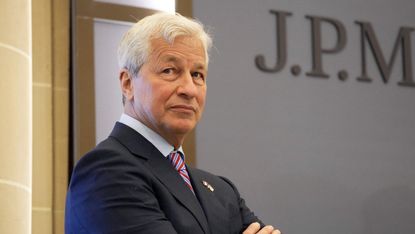The Chase app: challenging the banking challengers
JPMorgan Chase has launched a digital bank in London

Chasing Blighty
Under CEO Jamie Dimon, JPMorgan Chase “has sought to combat the threat of fintech”, said Ryan Browne on CNBC. Now the Wall Street Bank is heading straight to fintech’s European heartland, launching a digital bank in London this week.
The new outfit, dubbed Chase, will take on a clutch of banking “challengers”, including Monzo, Revolut and Starling – now flourishing as a result of Britain’s “fintech-friendly regulations” – as well as old guard lenders and Wall Street rival Goldman Sachs, which launched its Marcus savings account in 2018. There’s a lot riding on the move: “it marks the first international expansion of JPMorgan’s consumer bank brand in its 222-year history”.
Subscribe to The Week
Escape your echo chamber. Get the facts behind the news, plus analysis from multiple perspectives.

Sign up for The Week's Free Newsletters
From our morning news briefing to a weekly Good News Newsletter, get the best of The Week delivered directly to your inbox.
From our morning news briefing to a weekly Good News Newsletter, get the best of The Week delivered directly to your inbox.
Long haul
The Chase app is the culmination of three years’ development at JPMorgan’s Canary Wharf HQ, “mostly carried out in secret”, said Katherine Griffiths in The Times. The aim is to combine “the nimbleness of a start-up with the financial firepower that comes with being backed by one of the world’s biggest banks”. In June, JPMorgan also bought the UK wealth manager Nutmeg. It won’t be easy, said Lex in the FT. The move “goes against the grain” when big global banks are “cutting back their retail networks”. Britain is already “a very well-banked market”, and big companies can struggle with innovation. “Breaking even could be a long haul.”
Interesting rates
The new venture should “provide a shot in the arm to the stagnant current account market”, said Will Kirkman in The Daily Telegraph. Not least because of its eye-grabbing headline rates. Chase is touting 5% interest to customers – by some distance “the highest rate available on the market today”. There is, of course, “a catch”. That rate will only apply to “small change round-ups” – when the amount deducted from a debit card purchase is rounded up to the nearest pound. As Rachel Springall of Moneyfacts observes, “banking customers looking to switch” should “compare details carefully”. It’s the “overall package” that counts. Many interest-paying current accounts have disappeared over the past year, though there are still a handful to choose from. Virgin Money’s M Plus account pays 2% interest on balances up to £1,000; Nationwide’s FlexDirect account pays 1.98% on balances up to £1,500.
Sign up for Today's Best Articles in your inbox
A free daily email with the biggest news stories of the day – and the best features from TheWeek.com
Create an account with the same email registered to your subscription to unlock access.
-
 The worst fast food restaurants in America
The worst fast food restaurants in Americafeature American Customer Satisfaction Index's most recent ranking of our nation's fast food restaurants
By The Week Staff Published
-
 'The House GOP is begging to lose their majority'
'The House GOP is begging to lose their majority'Instant Opinion Opinion, comment and editorials of the day
By Harold Maass, The Week US Published
-
 Pig kidney transplant recipient dies
Pig kidney transplant recipient diesSpeed Read Richard Slayman has passed away two months after undergoing the historic procedure
By Peter Weber, The Week US Published
-
 Shein: could the year’s mega-IPO fall apart at the seams?
Shein: could the year’s mega-IPO fall apart at the seams?Talking Point Latest hitch is a pre-float 'security review' that could deter potential investors
By The Week UK Published
-
 Labor market strong as inflation sinks
Labor market strong as inflation sinksFeature And more of the week's best financial insight
By The Week US Published
-
 Midair blowout: another black mark for Boeing
Midair blowout: another black mark for BoeingFeature This isn't the first production issue Boeing has encountered
By The Week US Published
-
 Behemoths of the seas
Behemoths of the seasThe Explainer Cruise liners keep getting bigger, with the world’s largest 'megaship' ever built set to make its maiden voyage this month.
By The Week Staff Published
-
 Holiday season: Fed optimism cheers investors
Holiday season: Fed optimism cheers investorsFeature The feds believe their 'pivot' will make a recession unlikely
By The Week US Published
-
 Older workers stay in the labor force
Older workers stay in the labor forceFeature And more of the week's best financial insight
By The Week Staff Published
-
 America's most in-demand job
America's most in-demand jobFeature And more of the week's best financial insight
By The Week US Published
-
 Currency: the long reign of the mighty dollar
Currency: the long reign of the mighty dollarFeature Argentina is planning to drop the peso in favor of the US dollar
By The Week US Published